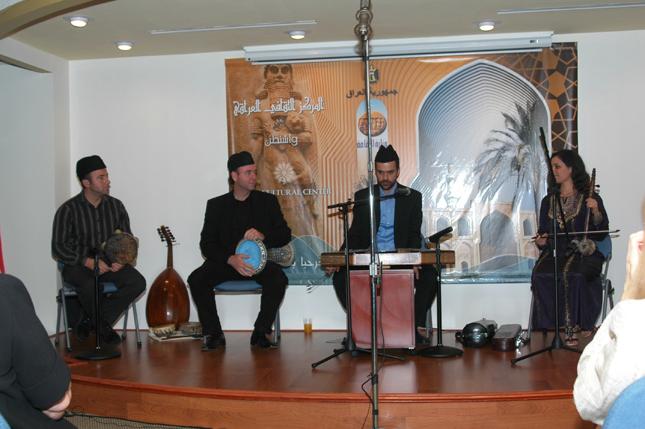The Iraqi Cultural Center
By • May 3, 2012 0 2215

Outside, it was a typical American-style Friday night in Dupont Circle, restaurants and watering holes busy, couples and groups of people wandering up and down the streets; a mild fall-like weekend
night, outdoor dining, indoor imbibing.
In that scene, the outside of 1630 Connecticut Avenue looked like any other night-time office building, but inside and out of view, at the site of the still new Iraqi Cultural Center upstairs, something different
was going on. Culture—in the form of ancient music inspired by and evocative of something as prosaic as coppersmithing—seemed to have had an accumulatively powerful effect on an audience gathered for the first concert offering of the 2010-2011 Embassy Series.
That particular Friday night, Embassy Series founder and director Jerome Barry had something that vividly illustrated what he’s always said the series are meant to be: staged musical events in embassies, ambassador residences, and cultural centers that double as cultural diplomacy.
Nothing demonstrated the possibilities and opportunities of cultural diplomacy more effectively then the merging of audience, performers, and Iraqi officialdom from the ranks of the embassy more than this Friday concert of music by the Safaafir Iraqi Maqam Ensemble, a young group of musicians of Iraqi and American heritage, who played music from, in effect, the Cradle of Civilization, but with new compositions.
An evening of Iraqi music played by musicians, some of them from the American Midwest searching for the roots of the music of their Iraqi heritage in front of an audience of Americans and Iraqis in Washington, D.C. has an undeniably powerful resonance – historically, politically, and culturally.
In Washington, Iraq lies vividly in the contemporary mind, full with memories of 9/11, the invasion, the fall of Saddam Hussein, thelong, violent American military presence, and the ongoing efforts of the country to recreate a viable nation and government. These things are impossible to put aside for any great length of time, but they can be softened by a keen appreciation of cultural opportunities that builds bridges.
“Iraq is not just a country of explosions,” said Samir Shakir Mahmood Sumaida’ie, the Ambassador of Iraq, speaking with a moving eloquence. “We are not just a country of violence and problems.
“This concert is about a different side of Iraq. We are an ancient people, part of a great civilization
from the Cradle of Civilization. What you will hear is music that goes back thousands of years. You will hear music made on instruments that presaged all string instruments, like the violin and the lute, as well as percussion instruments. You will hear music which came from the market place in old Baghdad, melodies which men and women, poets and vendors swayed to in that ancient city.”
“It’s a historic night for us,” Barry said. “Iraq is the 57th embassy to have participated in the Embassy Series.”
The group—made up of brother and sister Amir El Saffar and Dena El Saffar, Tim Moore, Zafer Tawil, and Carlo DeRosa—takes its name from a well known market in Baghdad, evoking the sound of the ancient art of coppersmithin. The rhythmic noises, din-like, constant, syncopated almost, result in singular works of beauty. The sound of what’s called Maqam—a kind of classical vocal tradition dating back centuries in Iraq—includes the metallic timbre of the instruments used in making the music, which includes percussion instruments and ancient string instruments, like the Santur and the Oud.
The result is something is so evocative that it’s almost otherworldly, but it persists in the market places and the society of Iraq where the music links up with poetry. In Iraq, poetry is serious business—not in the sense of being published, say, in magazines or academic circles, but as being written on a daily basis and recited at dinner among family members. Consider for a moment Ambassador Sumaidaie’s background. He is almost a quintessential techie, with degrees in electrical engineering and a diploma in computer study. He’s also an entrepreneur, a veteran diplomat, and he writes Arabic poetry in the classical form.
The brother and sister team of Amir and Dena El Saffar were pursuing traditional contemporary
musical studies and careers—Amir as a jazz trumpeter in New York, Dina with a degree in classical music. From the Midwest with an American mother and Iraqi father, they began to explore traditional Iraqi music and the result is the Safaafir Iraqi Maqam Ensemble.
With roots in secular poetry and Sufi mysticism, the Maqam as performed by the ensemble evokes more than anything a quality that is particular to Middle Eastern music. There is a stirring yearning, a building ecstasy achieved by repetition. In his vocals, Amir El Saffar builds a kind of musical mountain from sand. The repetition builds the emotion and it can careen from plaintive sadness to ecstatic joy. Some of the textual material—the words—are old stories about unrequited love. “The last one involved a man who meets a girl he instantly falls in love with,” Amir explained. “She’s part of a caravan. He goes to the caravan, but it’s already gone. So he follows, and they come to a monastery, where he’s just missed her. The monks listen to his story and begin to cry themselves, so sad is his plight.”
Lamentation is likely one of the first forms of music—a keening repetition that rends the heart. In its current musical form, it’s a more embracing kind of music. It pleads for participation.
The concert was the first performance event for the Iraqi Cultural Center, which opened in May. The concert proved to be a bridge to an older place, a better time, and the music made it vivid, where before, amid two wars, it had to be imagined.

